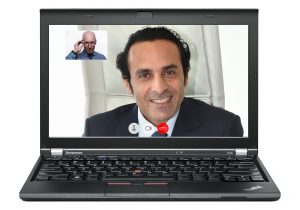Introduction
Project roles and strategic initiatives can significantly accelerate your career. They offer opportunities to connect outside of your functional area or business unit. They also provide possibilities to broaden your skills and to enlarge your understanding of the strategic challenges of the company or the organization you work for. Let’s see how Luigi took advantage of that and how his interpersonal skills allowed him to step up.
Luigi’s story
Luigi studied business administration and started his career in the controlling function of a large multinational company. He was part of the local finance team of one of the business units of that company. During the first couple of years, he did not stand out particularly. He was what could be qualified as a good but average performer. He was well appreciated by his teammates and by his line management. Luigi did never miss opportunities to show up in company events and to network with his colleagues. He found it easy to engage and had no barrier to connect also with senior management within his business unit. His friendly and engaging personality was well appreciated.
His role in controlling opened Luigi doors within his business unit. He showed interest in strategic projects outside his role and progressively he got access to information beyond his function. He had the talent to be at the right place at the right moment. Leaders from the business unit got used to see him around and gained confidence in him. He was always willing to share his views openly, which was well appreciated. He was also happy to offer support, for example for the organization of company events. This gave him further access to senior management, and it was not surprising to see him at lunch with members of the BU leadership group.
Luigi took great advantage of the possibility this gave him to get career advice and he started to seek new opportunities for himself. It was clear to him that he wanted to get a broader perspective. When a role in internal audit was published on the career page, he immediately consulted with some of the leaders he knew. They recommended that role, he applied and moved into audit. This was exactly the right step for him because his missions gave him access to the other business units of that company and he was even sent abroad for certain projects. Luigi was now operating at a completely different level. He kept very friendly relations with his former managers but was now talking to them at eye level. His playing field was now the corporate center. He applied the same approach to connect at that level and was thrilled to be able to interact with corporate executives. He was highly interested in the company’s strategic challenges. His finance background allowed him to understand the requirements related to financial markets and he followed this very carefully. He was always up to date and could surprise people he spoke to with information from the stock market that they had not yet received. That was a great topic for informal interactions in company events and Luigi naturally moved closer to the members of the board, whose confidence he gained.
Thanks to his network, Luigi was one of the first to hear about a major acquisition opportunity that was being assessed. He was fascinated by the magnitude of this project, which was seen as a potential game changer for the company. Luigi decided to make a bold step. He contacted the Chief Financial Officer, who he had only met a couple of times in meetings. He got a 15-minutes appointment, during which he offered to support this project. That came right on time, because the CFO had an appointment with the Chief HR Officer and the CEO on that same day to put a task force team together. Luigi’s name was mentioned. The CFO had appreciated the initiative taken by Luigi, which was a bit unusual in this rather hierarchical organization. He thought that his profile would be helpful in the task force and his board colleagues agreed. Two weeks later, the nomination of the task force members was published to everyone in the company and Luigi was on it. This gave him massive exposure. It was clear that this was the most important project for the company, that it was directly sponsored by the CEO and the board and that it could change the company’s future. Luigi was suddenly in the center of power and influence, even if he held a junior role in the task force.
Thanks to his network, Luigi was always the one who knew who to contact and what connections to establish. The project team used this and he was frequently tasked to reach out to people to get information or to ask for analysis. Luigi gained in self-confidence. He did not hesitate to instruct others on what they were expected to do to support this M&A project. Even the executive leaders at Global Business Unit level, those he was looking up to only a few years earlier, were now following his instructions diligently. Something changed in the way Luigi spoke. He could at times be very sharp and to the point.
Luigi did not shy away from being very clear if people were questioning the relevance of certain requests. Luigi learned to make other understand the power he had as a member of the task force, even if he had no direct line management responsibility. Luigi enjoyed this position. This was clearly the environment he felt comfortable in. He worked extremely hard. The project was a great success. Luigi became the chief of staff of the CEO for a couple of years and was later nominated General Manager of one of the smaller countries. From there he moved up the ranks within one of the business units and was seen as a leadership talent for the organization.
What can we learn from Luigi’s story?
Not everyone has Luigi’s talent to connect with others. His interpersonal skills are certainly quite exceptional. But there are nevertheless a couple of lessons we can draw from his story.
Company events and strategic projects offer opportunities to show engagement and to be visible
It is advisable to show interest for such topics that are outside of your direct scope of responsibility.
Networking is important. Do not shy away from using informal opportunities at company events to interact with leaders, even if they are at a significantly higher level. They will most likely be happy to hear the views from other people in the organization and to connect.
Strategic projects can offer exceptional career opportunities. You may consider getting involved in such initiatives.
Being bold and volunteering for project work might allow you to reach a level that would not be accessible through a linear career progression.
Being selected for such strategic projects might allow you to develop your leadership skills much faster. But be careful not to lose your humility even if you access to power.
More information in my book:
Sven Sommerlatte : Successful Career Strategy – An HR Practitioner’s Guide to Reach Your Dream Job (Springer, June 2023). ISBN: 978-3-662-66790-3




